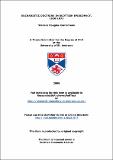Files in this item
Eucharistic doctrine in Scottish Episcopacy, 1620-1875
Item metadata
| dc.contributor.advisor | Elliott, Mark | |
| dc.contributor.author | Kornahrens, W. D. | |
| dc.coverage.spatial | 252 | en |
| dc.date.accessioned | 2008-12-11T10:34:30Z | |
| dc.date.available | 2008-12-11T10:34:30Z | |
| dc.date.issued | 2008-06-27 | |
| dc.identifier | uk.bl.ethos.552132 | |
| dc.identifier.uri | https://hdl.handle.net/10023/577 | |
| dc.description.abstract | This thesis is an examination of the eucharistic doctrine of ten Scottish theological writers in the tradition of Scottish Episcopacy; five from the seventeenth century, two from the eighteenth century, and three from the nineteenth century. The doctrine espoused by each one throughout the stated period, 1620–1875, is found to agree with the other writers considered herein, because each writer turned to many of the same Church Fathers as the source of his doctrine and his interpretation of Holy Scripture. The argument of this thesis is that all of the writers, rejecting the Tridentine, Lutheran, Bezan-Calvinist, and Zwinglian definitions of the Eucharist, maintained a material sacrifice in the Eucharist, which is an offering to God the Father of bread and wine as the propitiatory memorial of Christ’s death on the Cross, commanded by Christ himself at the Last Supper. The sacrifice is propitiatory because it is the means of representing the one sacrifice of Christ on the Cross to God the Father, thereby pleading the benefits of the Cross for the communicants. The bread and wine do not change substance, but become effectively the body and blood of Christ. Three of the ten writers produced eucharistic rites, one in the seventeenth century, and two in the eighteenth century. It is argued that each of these rites is expressive of the Eucharist as being a commemorative and representative sacrifice. Each rite explicitly offers bread and wine to the Father, invokes the Holy Spirit’s action over the elements, and prays that by receiving the consecrated bread and wine as the body and blood of Christ, the communicants will receive the forgiveness of sins, the continuing grace of the Holy Spirit, and eternal life. | en |
| dc.format.extent | 2675 bytes | |
| dc.format.mimetype | application/pdf | |
| dc.language.iso | en | en |
| dc.publisher | University of St Andrews | |
| dc.rights | Creative Commons Attribution-NonCommercial-NoDerivs 3.0 Unported | |
| dc.rights.uri | http://creativecommons.org/licenses/by-nc-nd/3.0/ | |
| dc.subject | Eucharist | en |
| dc.subject | Sacrifice | en |
| dc.subject | Memorial | en |
| dc.subject | Propitiatory | en |
| dc.subject | Scottish | en |
| dc.subject | Episcopacy | en |
| dc.subject | Material | en |
| dc.subject | Fathers | en |
| dc.subject | Commemorative | en |
| dc.subject | Representative | en |
| dc.subject.lcc | BX5320.K7 | |
| dc.subject.lcsh | Lord's Supper--Episcopal Church in Scotland--History of doctrines | en |
| dc.subject.lcsh | Lord's Supper (Liturgy)--Episcopal Church in Scotland--History | en |
| dc.title | Eucharistic doctrine in Scottish Episcopacy, 1620-1875 | en |
| dc.type | Thesis | en |
| dc.type.qualificationlevel | Doctoral | en |
| dc.type.qualificationname | PhD Doctor of Philosophy | en |
| dc.publisher.institution | The University of St Andrews | en |
This item appears in the following Collection(s)
Except where otherwise noted within the work, this item's licence for re-use is described as Creative Commons Attribution-NonCommercial-NoDerivs 3.0 Unported
Items in the St Andrews Research Repository are protected by copyright, with all rights reserved, unless otherwise indicated.


